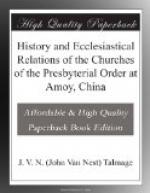We felt that the consequences were so momentous, that, before we should allow ourselves to be instrumental in thus (as we supposed) rending the “Body of Christ” at Amoy, we should make another effort to get the facts before the Church. As yet, we could not, if we would, carry out the resolution of Synod, and organize a Classis in connection with the Particular Synod of Albany, for, it was not till several years after, only very recently, that we had materials “enough to render the permanency of such an organization reasonably certain.” Therefore we wrote, as above, under date of December 23, 1857, and frequently wrote on the subject, as occasion offered.
Although our views were not made public (the Board judging that they had no right, or that it would not be for the good of the Church, and the interests of the Mission, to publish them), still we continued to prosecute our labors, in connection with the English Presbyterian brethren, receiving and giving mutual assistance. We were encouraged thus to continue our work: 1. Because of letters we received from home, some of them written by individuals who were able advocates of the decision of the Synod of 1857. They told us that it could not be otherwise than that a separation must come between us and the brethren of the English Presbyterian Church, but they would not have us inaugurate that separation. 2. (and more important) Because a marvelous blessing from on high was attending our labors. 3. (and most important) Because we knew this harmonious and mutual assistance to be entirely in accordance with the spirit of the Gospel.
In process of time a Church was organized at Chioh-be by the appointment of elders and deacons, then at Peh-chui-ia, then at Mapeng, and then the Church at Amoy was divided into two distinct organizations. Thus we had five organized churches, all of our order—the elders and deacons chosen and set apart according to our Forms, and all our Forms in use so far as there was yet occasion for them. Two of these churches were under the especial care of the English Presbyterians, and pecuniarily the work was sustained by funds collected in England and Scotland. The other three were under our especial care. The pecuniary expenses, beyond what the native churches could themselves raise, were borne by our Church at home.




